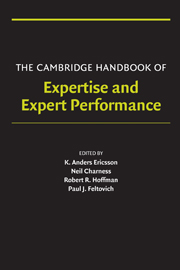Book contents
- Frontmatter
- Contents
- Acknowledgments
- Contributors
- PART I INTRODUCTION AND PERSPECTIVE
- PART II OVERVIEW OF APPROACHES TO THE STUDY OF EXPERTISE – BRIEF HISTORICAL ACCOUNTS OF THEORIES AND METHODS
- PART III METHODS FOR STUDYING THE STRUCTURE OF EXPERTISE
- PART IV METHODS FOR STUDYING THE ACQUISITION AND MAINTENANCE OF EXPERTISE
- PART V DOMAINS OF EXPERTISE
- PART V.A PROFESSIONAL DOMAINS
- 19 Expertise in Medicine and Surgery
- 20 Expertise and Transportation
- 21 Expertise in Software Design
- 22 Professional Writing Expertise
- 23 Professional Judgments and “Naturalistic Decision Making”
- 24 Decision-Making Expertise
- 25 The Making of a Dream Team: When Expert Teams Do Best
- PART V.B ARTS, SPORTS, & MOTOR SKILLS
- PART V.C GAMES AND OTHER TYPES OF EXPERTISE
- PART VI GENERALIZABLE MECHANISMS MEDIATING EXPERTISE AND GENERAL ISSUES
- Author Index
- Subject Index
- References
19 - Expertise in Medicine and Surgery
from PART V.A - PROFESSIONAL DOMAINS
- Frontmatter
- Contents
- Acknowledgments
- Contributors
- PART I INTRODUCTION AND PERSPECTIVE
- PART II OVERVIEW OF APPROACHES TO THE STUDY OF EXPERTISE – BRIEF HISTORICAL ACCOUNTS OF THEORIES AND METHODS
- PART III METHODS FOR STUDYING THE STRUCTURE OF EXPERTISE
- PART IV METHODS FOR STUDYING THE ACQUISITION AND MAINTENANCE OF EXPERTISE
- PART V DOMAINS OF EXPERTISE
- PART V.A PROFESSIONAL DOMAINS
- 19 Expertise in Medicine and Surgery
- 20 Expertise and Transportation
- 21 Expertise in Software Design
- 22 Professional Writing Expertise
- 23 Professional Judgments and “Naturalistic Decision Making”
- 24 Decision-Making Expertise
- 25 The Making of a Dream Team: When Expert Teams Do Best
- PART V.B ARTS, SPORTS, & MOTOR SKILLS
- PART V.C GAMES AND OTHER TYPES OF EXPERTISE
- PART VI GENERALIZABLE MECHANISMS MEDIATING EXPERTISE AND GENERAL ISSUES
- Author Index
- Subject Index
- References
Summary
Introduction
Expertise in medicine requires mastery of a diversity of knowledge and skills – motor, cognitive, and interpersonal – which makes it unlike many other fields of expertise, such as chess, bridge, computer programming, or gymnastics. Although some specialties such as pathology or surgery may emphasize one kind of skill or another, most clinicians must be skilled in all domains and must also master an enormous knowledge base drawn from areas as diverse as molecular biology, ethics, and psychology.
Perhaps paradoxically, despite the considerable effort required to achieve mastery, there is no formal equivalent of elite performance, which has been a topic of many other chapters in this book. Though there is stiff competition to enter medical school and only about 15% of Canadian applicants get a position, once in, better than 95% will graduate, get placement in a specialty (residency) program, and enter practice. Once certified competent, competition in practice is absent. Medicine has its legendary clinicians, but these are as rare as Olympic gold medalists and have not been systematically studied.
That is not to say that there are no measures of relative expertise. In some domains, particularly surgery, treatment success can be measured with indicators such as death, complications, or blood loss, and has been linked to physician characteristics like specialty certification (Ericsson, 2004; Norcini et al., 2002) and undergraduate training (Tamblyn et al., 2002).
- Type
- Chapter
- Information
- The Cambridge Handbook of Expertise and Expert Performance , pp. 339 - 354Publisher: Cambridge University PressPrint publication year: 2006
References
- 92
- Cited by

